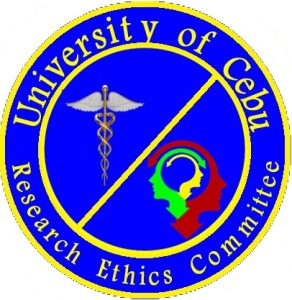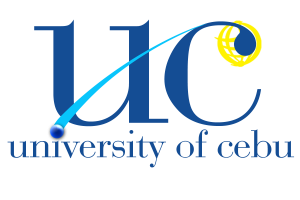UNIVERSITY OF CEBU
RESEARCH ETHICS COMMITTEE
STANDARD OPERATING PROCEDURES

UNIVERSITY OF CEBU
Academic Research Ethics Committee
Version No. 01
Approval Date: 06/20/2019
Effective Date: 05/10/2021
OVERVIEW

Vision – Mission Goal of The University
The University of Cebu has envisioned to democratize quality education and become the visionary and industry leader, which is turn gives hope and transforms lives, True to its vision, UC’s mission is to offer affordable and quality education responsive to the demands of local and international communities.
Research Program of University of Cebu
Research is a multi-disciplinary and multi-stakeholder activity of the university involving the administration, faculty, staff and students. In the pursuit of the foregoing vision-mission goal (VMG), the university has stablished a research center that makes policies and plans to promote and sustain interest in the utilization and accomplishment of quality, relevant and ethical, evidenced-based researches, which give benefits to the university and its stakeholders and the community it serves.
The UC-System Research Ethics Committee
The UC-System Research Ethics Committee is composed of two panels, the University of Cebu Academic Panel (UCAREC) and the University of Cebu Medical Panel (UCMREC). The UCAREC is an independent body, whose responsibility is to ensure the protection of the rights, safety and well – being of human subjects involved in health related research and to provide public assurance of that protection . In accordance with applicable national/international regulations, the UCAREC has the authority to approved, require modifications to, or disapproved research protocols and related documents as well as ensure compliance with its relevant procedures after approval.
The UCAREC reviews and monitors researches that involve:
- University of Cebu students, faculty done with the school and community premises by its staff
- Protocols done by University of Cebu full-time staff in areas outside the school premises, except
researches undertaken by part time school staff done outside the school. - Protocols from researches outside the University of Cebu whose participants include individuals
from the community. - Researchers referred from the PNHRS, PHREB, DOH, industry organizations, and others on
the condition that host school/ institution where the research will be conducted accepts the review
of UCAREC and agrees to abide by the rules and regulations that UCAREC follows (based on PHREB
and FERCAP rules.)
This SOP provides the Terms of Reference (TOR) that describes the framework for the constitution of
the UCAREC, the responsibilities and activities of its officers, members, staff, and independent
consultants.
It is the responsibility of the UCAREC members, officers, and secretariat to understand and implement
the SOPs. Moreover, it is their duty to inform mentors and students directly or indirectly engaged in
conducting researches involving human subjects, of the different SOP activities, workflows, and
timeframes. It is the duty of these individuals to fully abide with and comprehend the SOP activities,
workflows, and timeframes in order to prevent undue delays in the submission of research proposals
and final reposts.
Ethical basis
The UCAREC is guided in its reflection, advice and decision by the ethical principles and procedures expressed in the following guidelines and documents:
International Conference on the Harmonization of Good Clinical Practice (ICH-GCP)
National Ethical Guidelines for Health Research (2017) by the Philippine Health Research Ethics Philippine Food and Drug Authority regulations
Health Organization (WHO)
participants (2011) by the World Health Organization of Good Clinical practice (ICH-GCP)
Board (PHREB)
The UCAREC adheres to national and international ethical standards and recognizes that protocols it approves may also be approved by national and/or local ethics committees prior to their implementation in specific localities.
In Evaluating protocols and ethical issues, The UCAREC is cognizant of the diversity of laws, cultures, and practices governing health research in various countries around the world.
In evaluation protocols and ethical issues, UCARECis cognizant of the diversity of laws, cultures and practices governing health research in various countries around the world.
It attempts to inform itself, whenever possible, of the requirements and conditions of various localities where a proposed University of Cebu research is being considered.
The UCAREC will take the initiative to be informed, as appropriate, by national/local ethics committees and researchers of the impact of the research that it has approved.
The UC-System Research Ethics Committee
The UC-System Research Ethics Committee is composed of two panels, the University of Cebu Academic panel (UCAREC). and the UCAREC is an independent body, whose responsibility is to ensure the protection of the rights, safety and well- being of human subjects involved in the health related research and to provide public assurance of that protection In accordance with applicable national/international regulations, the UCAREC has the authority to approve, require modifications to, or disapprove research protocols and related documents as well as ensure compliance with its relevant procedures after approval.
The UCAREC reviews and monitors researches that involve:
University of Cebu students, faculty, done within the school and community premises by its staff
- Protocols done by University of Cebu full-time staff in areas outside the school premises, except researches undertaken by part time school staff done outside the school.
- Protocols from researchers outside the University of Cebu Whose participants include individuals from the community.
- Researches referred from the PNHRS, PHREB, DOH, industry organizations, and others on the condition that the host school/ institution where the research will be conducted accepts the review of UCAREC and agrees to abide by the rules and regulation that the UCAREC follows (based on PHREB and FERCAP rules).
This SOP provides the Terms of Reference (TOR) that describes the framework for the constitution of the UCAREC, the responsibilities and activities of its officers, members, staff, and independent consultants.
It is the responsibility of the UCAREC members, officers, and secretariat to understand and implement the SOPs. Moreover, it is their duty to inform mentors and students directly or indirectly engaged in conducting researches involving human subjects, of the different SOP activities, workflows, and timeframes, in order to prevent undue delays the submission of research proposals and final reports.
ETHICAL basis
The UCAREC is guided in its reflection , advice, and decision by the ethical principles and procedures expressed in the following guideline and documents:
- Operational Guidelines for Ethics Committees that Review Biomedical Research (2000) by the World Health Organization (WHO)
- Declaration of Helsinki (2008 and subsequent revisions)
- CIOMS 2002 and 2009
- Standards and Operational Guidance for Ethics Review of Health-Related Research with Human Participants (2011) by the World Health Organization (WHO)
- International Conference on the Harmonization of Good Clinical Practice (ICH-GCP)
- National Ethical Guidelines for Health Research (2017) by the Philippines Health Research Ethics Board (PHREB)
- Philippine Food and Drug Authority regulations
- Other relevant laws and regulations
The UCAREC adheres to national and international ethical standards and recognizes that the protocols it approves
The UCAREC adheres to national and international ethical standards and recognizes that the protocols it approves may also be approved by national and/or local ethics committees prior to their implementation in specific localities.
In evaluating protocols and ethical issues, the UCAREC is cognizant of the diversity of laws, cultures, and practices governing health research in various countries around the world.
It attempts to inform itself, whenever possible, of the requirements and conditions of various localities where a proposed University of Cebu research is being considered.
The UCAREC will take the initiative to be informed, as appropriate, by national/local ethics committees and researchers of the impact of the research that it has approved.
